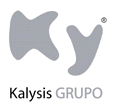 |
|
|
 |
“¿Qué es estrategia? Continuar disparando cuando ya no se tienen balas, sólo para que el enemigo no lo perciba.”
- Anónimo
Nunca infravalore la importancia de la incompetencia en las organizaciones. Ha sido siempre la fuente del descontento, la independencia y el éxito de la actividad emprendedora (William Bliss)
I was figuring on starting some kind of business, but most every business is already engaged more than's necessary; and then, I ain't got no business ability. What I want is something that don't call for no kind of ability whatsoever and no kind of exertion to speak of, and ain't out of town, and pays good, and has a future. (Unattributed but, perhaps the best description of the wannabe entrepreneur)
|
 |
| Bajo el Patrocinio de Kalysis GRUPO |
|
 |

La empresa española cuenta con la patente del nuevo DNI electrónico |
 |
| Bajo el Patronazgo del Centro Andaluz de Emprendedores |
|
 |

|
|
 |
 |
56% of Spanish Directors prefer a participative leadership style
Publicado por: EUROWARDS |
|
 |
Tema EUROWARDS
56% of Spain’s directors prefer a participative style of leadership, and 75% say that they regularly, or almost always use coaching, a personalised style that focuses on employee development. This is one of the conclusions of the first study on ´Leadership from a Spanish perspective´ drafted by Instituto de Empresa and Deloitte, aimed at analysing the concept of leadership among senior management in major Spanish companies.
The report affirms that future leaders have to be goal-oriented and act as coaches, and that they must centre on developing their subordinates’ talents, equipping them with the skills and knowledge they need to work effectively and in lockstep with their teams. This new style of leadership is essential when it comes to competitiveness and organisations’ survival, explains Carlos Pastor, Director of the Centre for Global Leadership at Instituto de Empresa. He also stresses that participative leadership is not the norm among the Spanish directors who took part in the survey. Only half of survey participants almost always use this style. Pastor affirms that there is a need to adapt their style of leadership and make it more participative, a process that takes time and requires commitment from leaders.
41 % of directors stated that their favourite style of leadership is contingent reinforcement, that is to say that it rewards subordinates for their commitment and achievements. 37% use the goal-oriented style, based on meeting challenges. “Without doubt these are styles that can work well with subordinates who have the skills and knowledge needed to carry out the type of work in question. But those who need training in order to assume new responsibilities may feel frustrated and lose motivation, says Enrique de la Villa, a Partner at Deloitte, and head of human capital.
The styles least favoured by senior managers in Spain are those based on coercion, a one-way management style with little or no participation on the employee’s part and exception-based management, which means that the director only steps in to sort out mistakes.
Leadership based on experience and company size
International experience is strongly associated with the conception of leadership and management philosophy. Hence, leaders with experience outside Spain show a preference for visionary and transactional leadership styles, in keeping with the coaching concept. These directors are less directive, and also place more emphasis on objectives.
It is therefore logical that younger Spanish firms are led by directors that generally prefer to use visionary and coaching styles of leadership. Moreover, leaders of relatively new firms are better at leadership styles that are based on objectives and development. Where different sectors are concerned, the report reveals how directors in the financial sector tend to use leadership styles that are more direct, transactional and less oriented to learning. While companies in the technology sector give more importance to coaching and vision.
The study also includes an analysis of the attitudes of leaders as having a direct impact on their styles of leadership. This part of the report is the most innovative in that it includes an analysis of relations between perceptions and leadership styles, with significant implications for directors. Researchers measured the concept that leaders have of their subordinates and found that only 46% of Spanish leaders have a “good” concept of their subordinates. These leaders think, for example, that subordinates like to assume responsibilities and that they are willing to work in the companies’ interests. These leaders tend to use coaching as their preferred style of leadership. 26% of survey participants, however, have a fairly negative concept of their subordinates. They think, for example that the majority of subordinates are against assuming responsibilities or working in the companies’ interests. These leaders show a clear tendency to use directive and transactional management styles.
Finally, the study measured the degree to which leaders are oriented to development - if they value learning and development over and above achieving objectives, or if objectives are more important than development. The results of the study show clearly that leaders highly oriented to development are also most concerned about developing their subordinates, forging emotional links with them and using participative and coaching leadership styles.
|
 |
 |
| |
|
| "56% of Spanish Directors prefer a participative leadership style" | Entrar o crear una cuenta | 0 Comentarios |
|
| | Los comentarios son propiedad de quienes los publican. No somos responsables de su contenido. |
|
